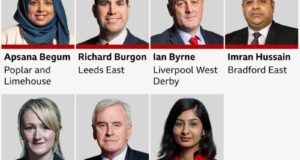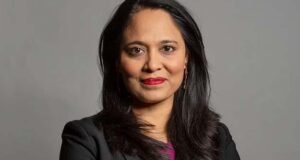 The bus driver’s son from Tooting ended the mayoral dream of the former Olympics minister, winning in the final round by 58.9 per cent to 41.1 per cent.
The bus driver’s son from Tooting ended the mayoral dream of the former Olympics minister, winning in the final round by 58.9 per cent to 41.1 per cent.
His surprise victory was fuelled by thousands of supporters of Left-winger Jeremy Corbyn —and set alarm bells ringing among Labour modernisers.
It sets the scene for an electrifying showdown for the capital’s top job next May, almost certainly against Conservative frontrunner Zac Goldsmith.
But some Labour MPs said Dame Tessa would have stood a better chance of winning, and pointed to polls showing she had more cross-party appeal.
If he wins, human rights lawyer Mr Khan, 44, will make history as the capital’s first Muslim mayor.
As the result was declared at Royal Festival Hall, Mr Khan said he would serve “all Londoners”. “I am deeply humbled to have received the support of tens of thousands of Londoners,” he said. “I am determined to repay that trust by winning the mayoral election next May, and making a real difference to Londoners’ lives.
“London gave me and my family huge opportunities. A council house so we could save for a deposit to buy our own home. A secure job for my dad as a bus driver. A great education for me and my siblings, affordable university places and good quality apprenticeships. As Mayor I will provide more opportunities for all Londoners.
“My priorities for Londoners are clear. An affordable and secure home to rent or buy. More jobs with higher wages for the lowest paid. Making it easier to set up and run a successful business. Reducing the cost of commuting and making London’s environment safer, healthier and less polluted.”
Dame Tessa told The Standard: “I’m extremely proud of the positive campaign we have run this summer but it wasn’t to be.
“I wish Sadiq every success in fighting the election next year and winning City Hall back for Labour.”
It was the hardest-fought Labour selection contest since Ken Livingstone locked horns with Frank Dobson in 2000.
First to be knocked out was Harrow West MP Gareth Thomas, followed by transport expert Christian Wolmar. Tottenham MP David Lammy came fourth and was next to be knocked out, followed by Diane Abbott.
The final tally, taking into account second preferences, was 48,152 votes for former shadow London minister Mr Khan and 33,573 for Dame Tessa.
May’s mayoral contest will be of major national significance — as the first real test of Labour under its new leader, expected to be named tomorrow as Mr Corbyn.
At stake is a £17 billion budget, huge international profile and control of transport, policing and housing in the capital. The new Mayor will also take on newly devolved powers over skills, transport, planning and health.
Mr Khan had the support of all the big unions, including Unite and the GMB. His campaign is expected to focus on housing, pledging to take personal charge of making it cheaper and easier to buy a home in London. His key proposals include setting up a new “economic fairness” unit at City Hall to work with the public and private sectors to deliver higher wages and better pay and conditions.
He would freeze Tube and train fares until 2020 and cut bus fares, while campaigning against Heathrow expansion and striving to improve London’s poor air quality.
But to win he will have to boost Labour support in outer London, where the party trails behind the Tories, and appeal to Londoners who do not normally vote Labour.
During the campaign, Mr Khan visited more than 200 workplaces, community centres, churches, temples and mosques and set up a new platform for young voters — Dare to Dream.
He also won the backing of 16 London Labour MPs, as well as senior figures from across the party including Ken Livingstone and Neil Kinnock.
He had a huge field operation, with 350 volunteers giving up their spare time to campaign every week.
There are now nearly three times as many Labour members and supporters in London — 114,000 — as at the general election, although many of these are a result of Corbynmania.
Mr Khan grew up on a council estate in Tooting with his parents and seven siblings. His father was a bus driver while his mother took in sewing to make ends meet.
He attended a local state school and studied law at university. He worked as a human rights lawyer for more than a decade before entering politics as a councillor. He became MP for Tooting 2005 and became the first Muslim to attend Cabinet as transport minister under Gordon Brown
 Weekly Bangla Mirror | Bangla Mirror, Bangladeshi news in UK, bangla mirror news
Weekly Bangla Mirror | Bangla Mirror, Bangladeshi news in UK, bangla mirror news







